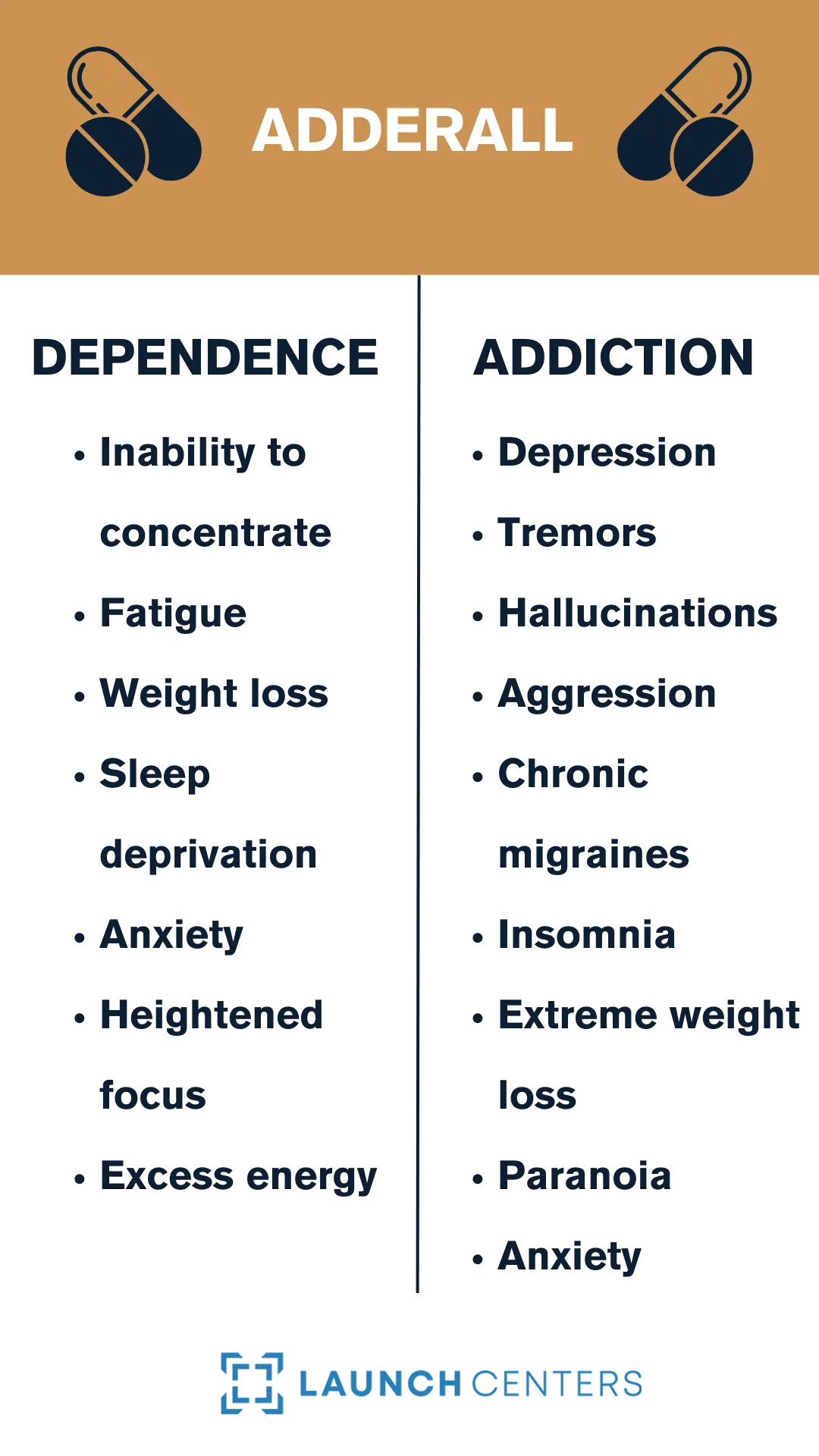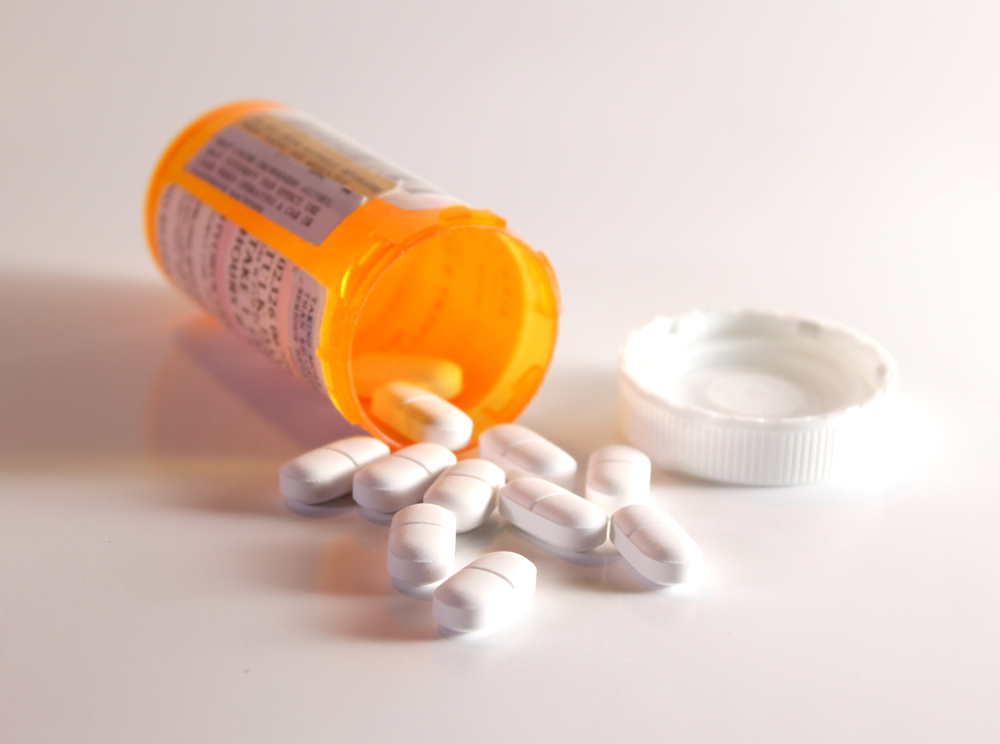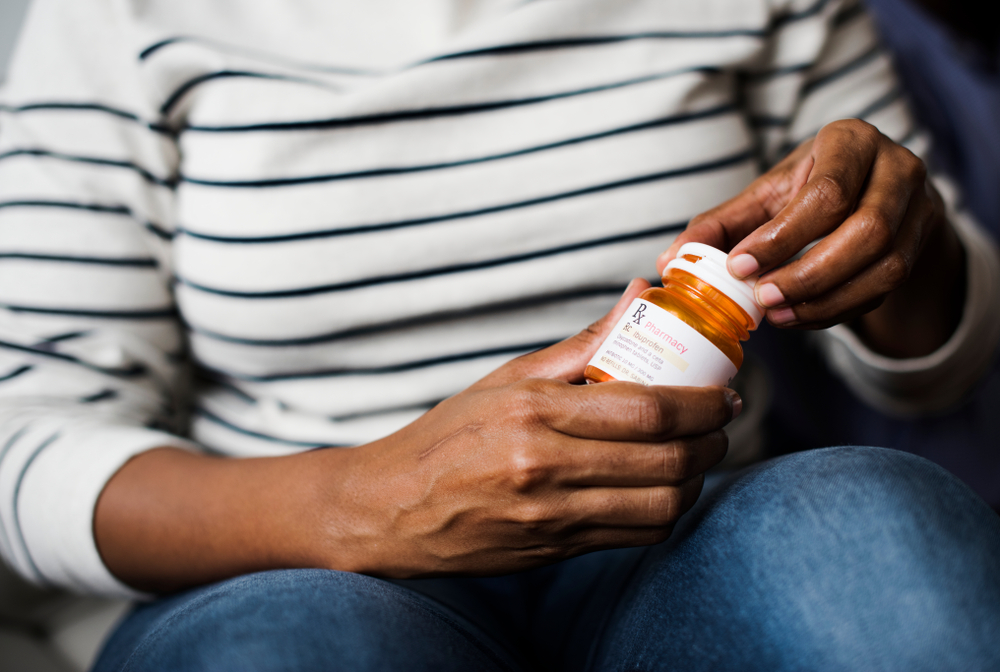Medically Reviewed By Jodi Mabry, Nurse Practitioner (NP)
When considering Adderall addiction vs Adderall dependence, they may sound similar. However, there are distinct differences between depending on this medication and actively abusing it to achieve a high. Because of its strength and accessibility, Adderall addiction and abuse are serious issues.
While not everyone who takes Adderall will become addicted, those frequently taking Adderall at unprescribed doses are at an increased risk of addiction. As time passes, those who habitually take Adderall develop a tolerance to it and are unable to function normally without it.
Continue reading to learn more about Adderall, signs of Adderall misuse, and treatment options available if you or a loved one is struggling with this addiction.
What is Adderall?
Amphetamine and dextroamphetamine are the active ingredients in Adderall, a medication used to treat narcolepsy and attention deficit hyperactivity disorder. Dextroamphetamine and amphetamine are both central nervous system (CNS) stimulants that affect chemicals in the brain and nerves involved in impulsiveness and hyperactivity. Adderall is a stimulant, like caffeine, but much more powerful. Some people, especially younger adults and teens, misuse the drug to get high or to feel alert and energetic.’
Dependence Vs. Addiction
Dependence is a physical reliance on a substance or behavior to function normally, while addiction is a psychological and behavioral disorder characterized by compulsive drug-seeking or behavior despite negative consequences. In short, dependence is a physical response, while addiction is a psychological disorder.
Adderall Addiction vs Adderall Dependence
Due to the drug’s chemical composition, an Adderall dependency is a natural and expected physiological response. An individual with an Adderall dependency has a physical dependence (even if they take the drug as prescribed), but not a psychological addiction wherein they abuse the drug to achieve a ‘high.’ Physically, the chemicals may affect the brain in a way that makes it hard for the individual to stop taking Adderall; however, they will not obsess over or crave it mentally and will merely require a physician’s help in tapering off the drug.
An Adderall addiction is characterized by a person’s physical or mental dependency on the drug, as well as certain behaviors. These individuals are unable to function when they discontinue Adderall and will do whatever they can to obtain more of the drug. Their major goal is taking the drug. They frequently run out of their prescription early because they take more than the recommended amount, leaving them in Adderall withdrawal, which motivates them to obtain more of the substance. Obsessive Adderall cravings and thoughts are also indicators of addiction.
Can You Become Addicted To Adderall If You Have ADHD?
Yes, it is possible to become addicted to Adderall, even if you have ADHD. Taking higher doses or using it for non-medical purposes to increase its effects can lead to dependence, tolerance, and addiction.
Signs of Adderall Dependence
It’s more common than you may think for people to become physically dependent on Adderall. Even people who take it as directed can become physically dependent on it. Individuals who take Adderall for more than a couple of months for medical purposes are prone to developing a physical dependency on the drug. When you’re physically dependent on a drug like Adderall, you’ll experience withdrawal symptoms if you try to quit. Signs of Adderall dependency include:
- Inability to concentrate without Adderall
- Fatigue when use is ceased
- Weight loss
- Sleep deprivation
- Anxiety
- Heightened focus
- Excess energy
Signs of Adderall Addiction
Certain actions are indicative of an Adderall addiction. Those who are hooked on Adderall can’t function without it, so they prioritize getting and using the drug above everything else. Addicted individuals have difficulty controlling how much Adderall they consume, and they may neglect important family or social obligations as a result. The following are signs that an addiction to Adderall has developed:
- Depression
- Tremors
- Hallucinations
- Aggression
- Chronic migraines
- Insomnia
- Extreme weight loss
- Paranoia
- Anxiety

How Does Adderall Affect the Brain?
Adderall increases the activity of several neurotransmitters, including serotonin, norepinephrine, and dopamine. Adderall increases concentration and energy while suppressing the appetite. Adderall increases the activity of several neurotransmitters including serotonin, norepinephrine, and dopamine.
Long-term alterations in dopamine function can alter our reward system and make us dependent on chemical assistance to experience pleasure. Every time Adderall is consumed, these alterations become more entrenched. As tolerance to the drug develops, more Adderall may be required to achieve the desired effects. Adderall and other prescription stimulants have been linked to psychotic symptoms, schizophrenia, and other paranoid delusions.
Long-term amphetamine stimulant use or withdrawal from Adderall may also produce anxiety and panic attacks. Warnings about the potential negative psychiatric consequences of Adderall are even present on its labels from the U.S. Food and Drug Administration, or FDA. Someone with a mental health condition like bipolar disorder or schizophrenia have an increased likelihood of developing these psychiatric symptoms.
Dangers of Adderall Abuse
Long-term use of Adderall can result in a variety of health problems, ranging from minor to life-threatening. Physiological and psychological effects are caused by Adderall abuse, and their severity varies depending on the duration of use, the frequency and intensity of use, and the user’s age. Individuals who abuse Adderall over a long period of time might experience a variety of emotional and mental issues, including depression, anxiety, irritability, and difficulty concentrating, as well as serious physical health problems, including heart disease, weight loss, difficulty sleeping, and others.
Abusing Adderall can contribute to mental health issues, since it affects the brain. According to the National Institute on Drug Abuse, abusing Adderall alters brain chemicals like dopamine. In some people, this can lead to serious psychiatric issues like psychosis, paranoia, anxiety, or depression.
According to the National Institute on Drug Abuse, Adderall increases blood pressure, heart rate, and breathing rate while decreasing blood flow. The Food and Drug Administration (FDA) has issued a “black box” warning label linking Adderall to serious heart problems. The FDA says that people taking Adderall have an increased chance of heart attack, stroke, irregular heartbeat, and coronary artery disease.
Can You Overdose on Adderall?
Yes, you can overdose on Adderall. Despite the fact that Adderall can be deadly if combined with other medicines or drugs, the amount that could result in an overdose varies from person to person. The quantity you take and your sensitivity to stimulants determine how much you might overdose on Adderall. A lethal dose of amphetamine is thought to be between 20 and 25 mg per kg of weight. For example, a lethal dose for a person who weighs 150 pounds is about 1,400 mg. However, a lethal overdose has been reported as little as 1.5 mg/kg of weight.
Signs of an Adderall Overdose
If you take too much Adderall, an amphetamine, you may experience a wide range of mild to severe symptoms. Your reaction will be determined by how much Adderall you took, your body chemistry, how sensitive you are to stimulants, and whether you took other substances in addition to Adderall. The following are indicators of an Adderall overdose:
- Headache
- Confusion
- Nausea
- Vomiting
- Rapid breathing
- High heart rate
- Panic
- Aggression
- Hallucinations
- Tremors
- Fever
What to Do in the Event of an Adderall Overdose
If you think someone is taking too much Adderall, call 911 immediately. Provide details to medical personnel, including the person’s age, previous medical issues, any Adderall allergies, whether they consume alcohol or drugs, and the quantity of Adderall they took
. Maintain the person in a safe environment to avoid being hurt by sharp objects if they have a seizure. A fast treatment for amphetamine overdose improves the chances of a full recovery. Medical monitoring, medicines, and supportive care are all included in treatment for amphetamine overdose, which includes heart attacks and seizures.
Can You Treat ADHD Without Adderall?
There are several treatment options for ADHD besides Adderall, and the best approach depends on an individual’s specific symptoms and needs. Here are some alternatives to Adderall for managing ADHD:
- Behavioral therapy: Behavioral therapy, such as cognitive-behavioral therapy (CBT), can be an effective treatment for ADHD, especially when combined with medication. Behavioral therapy can help individuals develop strategies to manage their symptoms and improve their social skills, organization, and time management.
- Non-stimulant medications: Non-stimulant medications, such as atomoxetine (Strattera), guanfacine (Intuniv), and clonidine (Kapvay), can also be effective for managing ADHD symptoms. These medications work differently than stimulants and may be better suited for individuals who can’t tolerate or don’t respond well to stimulants.
- Lifestyle changes: Making lifestyle changes, such as regular exercise, a healthy diet, and good sleep habits, can also help manage ADHD symptoms. These changes may not be enough to manage severe symptoms but can be a helpful addition to other treatment approaches.
Treatment for Adderall Abuse and Addiction
Adderall can be addictive if taken without a prescription. It is vital that you get help in order to properly deal with Adderall addiction. The initial step in recovery is to manage withdrawal from Adderall, along with relapse triggers and warning signs. In order to maintain abstinence, you will have to resist the challenges of fatigue, depression, and lack of concentration without professional help.
A person addicted to Adderall can be monitored during detox at a qualified treatment center. For heavy users, Adderall detox usually involves a gradual reduction strategy. Using this strategy, the drug is slowly eliminated from the body to minimize uncomfortable withdrawal symptoms such as depression and fatigue.
During the recovery process, maintaining sobriety requires ongoing therapy and support. An Adderall addiction is rooted in various social, professional, and academic difficulties. Therapy can assist clients to discover healthy alternatives to cope with these problems. To recover, users must explore these issues and find solutions to them.
Every user and treatment provider determines the length of time required for Adderall rehab. The level of treatment is determined by the user’s need. Those with severe addictions usually require longer rehab stays. Treatment can last between 28 and 90 days.
Adderall Addiction Treatment in Asheville, NC
It is important to distinguish Adderall addiction vs Adderall dependence to determine if you or a loved one is possibly suffering from addiction. At Asheville Recovery Center, we provide a range of treatment options to assist those with drug or alcohol addiction problems. We use a 12-step program and combine holistic rehabilitation techniques in our programs. Intensive outpatient, detox referral, partial hospitalization, and aftercare services are available at the facility.
To get assistance with drug or alcohol addiction, contact Asheville Recovery Center’s treatment specialists today. You no longer have to struggle alone.










